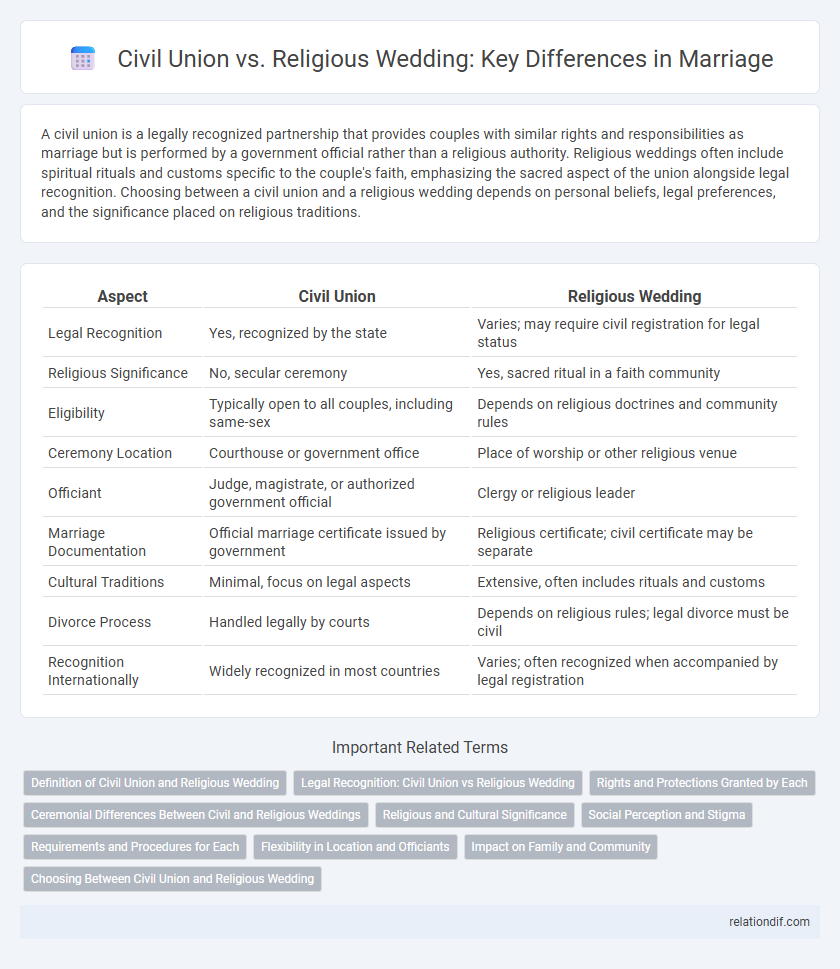A civil union is a legally recognized partnership that provides couples with similar rights and responsibilities as marriage but is performed by a government official rather than a religious authority. Religious weddings often include spiritual rituals and customs specific to the couple's faith, emphasizing the sacred aspect of the union alongside legal recognition. Choosing between a civil union and a religious wedding depends on personal beliefs, legal preferences, and the significance placed on religious traditions.
Table of Comparison
| Aspect | Civil Union | Religious Wedding |
|---|---|---|
| Legal Recognition | Yes, recognized by the state | Varies; may require civil registration for legal status |
| Religious Significance | No, secular ceremony | Yes, sacred ritual in a faith community |
| Eligibility | Typically open to all couples, including same-sex | Depends on religious doctrines and community rules |
| Ceremony Location | Courthouse or government office | Place of worship or other religious venue |
| Officiant | Judge, magistrate, or authorized government official | Clergy or religious leader |
| Marriage Documentation | Official marriage certificate issued by government | Religious certificate; civil certificate may be separate |
| Cultural Traditions | Minimal, focus on legal aspects | Extensive, often includes rituals and customs |
| Divorce Process | Handled legally by courts | Depends on religious rules; legal divorce must be civil |
| Recognition Internationally | Widely recognized in most countries | Varies; often recognized when accompanied by legal registration |
Definition of Civil Union and Religious Wedding
A civil union is a legally recognized partnership between two individuals, granting many of the same rights and responsibilities as marriage without religious involvement. A religious wedding is a marriage ceremony conducted according to the traditions and doctrines of a particular faith, often involving specific rituals and spiritual commitments. Civil unions focus on legal recognition by the state, while religious weddings emphasize spiritual and cultural significance.
Legal Recognition: Civil Union vs Religious Wedding
Civil unions offer legal recognition of a partnership, granting rights such as property ownership, inheritance, and healthcare decision-making that vary by jurisdiction. Religious weddings primarily provide spiritual and ceremonial acknowledgment, which may not confer legal rights unless accompanied by a civil registration. Couples seeking legally binding status should ensure their religious marriage complies with local legal requirements to secure full legal benefits.
Rights and Protections Granted by Each
Civil unions provide couples with legal rights and protections similar to marriage, including inheritance rights, tax benefits, and health care decision-making authority, recognized by the state. Religious weddings primarily offer spiritual and community recognition without automatically granting legal rights, which vary depending on jurisdiction and may require a separate civil marriage for legal protections. Couples seeking comprehensive legal rights should consider both civil registration and religious ceremonies to ensure full protection under the law.
Ceremonial Differences Between Civil and Religious Weddings
Civil weddings are typically conducted by a government official or judge in a secular venue, emphasizing legal documentation and minimal religious symbolism. Religious weddings usually take place in a place of worship, following specific rituals and traditions dictated by the faith, with clergy officiating the ceremony. These ceremonial differences highlight the contrasting roles of legal recognition versus spiritual significance in each type of marriage ceremony.
Religious and Cultural Significance
Religious weddings hold profound spiritual significance, symbolizing a sacred covenant blessed by a higher power within a community's faith tradition. These ceremonies often incorporate rituals and customs deeply rooted in cultural heritage, reinforcing identity and shared values across generations. In contrast to civil unions, religious weddings foster communal participation and spiritual continuity that strengthen familial and societal bonds.
Social Perception and Stigma
Civil unions often face less social recognition compared to religious weddings, which are traditionally viewed as more legitimate within many communities. Religious ceremonies frequently carry cultural and spiritual significance that reinforces social acceptance, while civil unions may be perceived as lacking emotional or moral weight. The stigma around civil unions can stem from entrenched societal norms valuing religious institutions, impacting the social validation of these partnerships.
Requirements and Procedures for Each
Civil unions typically require legal documentation, identification, and a formal application process conducted at a government office, often including waiting periods and fees. Religious weddings involve specific rituals dictated by the faith, requiring coordination with clergy, adherence to doctrinal requirements, and sometimes pre-marital counseling or membership within the religious community. Both ceremonies may require witnesses, but civil unions emphasize compliance with state laws, while religious weddings prioritize spiritual and cultural traditions.
Flexibility in Location and Officiants
Civil unions offer greater flexibility in location, allowing couples to choose a wide range of venues such as parks, beaches, or private homes without strict religious constraints. Officiants in civil unions can include judges, justices of the peace, or licensed celebrants, providing diverse options tailored to the couple's preferences. Religious weddings often require ceremonies to take place in designated sacred spaces and must be officiated by clergy members affiliated with the respective faith tradition.
Impact on Family and Community
Civil unions often provide legal recognition and rights that support family stability and social benefits, fostering inclusivity within diverse communities. Religious weddings typically emphasize spiritual values and cultural traditions, strengthening communal bonds and shared beliefs among participants. The choice between civil and religious ceremonies influences family dynamics and community integration based on legal protections or faith-based connections.
Choosing Between Civil Union and Religious Wedding
Choosing between a civil union and a religious wedding hinges on personal beliefs, legal recognition, and cultural values. Civil unions offer legal rights such as tax benefits, inheritance, and healthcare decision-making without religious connotations, suitable for couples prioritizing legal protection. Religious weddings provide spiritual significance and community validation, aligning with couples' faith traditions but may require additional civil registration for legal status.
Civil Union vs Religious Wedding Infographic

 relationdif.com
relationdif.com